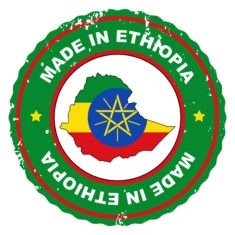

The importance of MSEs to the Ethiopian economy cannot be overstated.
In Ethiopia, Micro and Small Enterprises (MSEs) are the second largest employment-generating sector, after agriculture. According to the Entrepreneurship Development Center (EDC) of Ethiopia, before the COVID-19 pandemic, there were 1.5 million MSEs, employing 4.5 million people and generating 40.7 billion Birr (760 million US) in monthly sales.
Micro and small enterprises (MSEs) are businesses with revenues, assets, or employee counts that fall below a certain threshold.
While there is no universally accepted threshold for what constitutes a MSE, countries consider, in varying proportions, the number of employees, turnover, and asset value. In Ethiopia, a micro-enterprise is defined as an enterprise with no more than 5 employees, including the owner, and total assets of less than or equal to $5,000 US for the industrial sector and less than $2,500 US for the service sector. A company with 6-30 employees and total assets of $5,001-$75,000 US in the industrial sector and $2,500-25,000 US in the service sector is classified as a small enterprise.
MSEs were once thought to be marginal and unproductive, contributing little to a country's economic growth. However, in recent decades their importance in terms of job creation and income generation has been widely recognized and has become the primary playing field for policymakers.
According to the World Bank, MSEs represent about 90 percent of businesses and provide 50 percent of worldwide employment. Additionally, MSEs contribute up to 40 percent of the gross domestic product in emerging economies.
The economic and social benefits of MSEs include:
MSEs are the engines of economic growth in Ethiopia. They face, however, many barriers to achieving expansion and growth.
Recognizing and overcoming these challenges is an important question for the Ethiopian government.
Policymakers must consider ways for MSEs to reduce financial barriers, improve support systems, and empower them to realize their full potential by instilling the values of innovation, creativity, and decent work for all.
Access to finance is one of the key elements that determine the development and success of MSEs. It is crucial for helping them to set up, maintain, develop and grow their business.
However, limited access to finance is one of the leading constraints affecting the growth of MSEs in Ethiopia, despite the fact that 90 percent of MSEs rely on external sources of finance, generally from investment banks, commercial banks, and other governmental microfinance institutions (MFIs).
For example, the share of loans provided to the MSE sector is deteriorating because:
Firstly, through appropriate policies, the government should improve the financial environment.
For example, they should promote more risk-sharing guarantee schemes (RSGS). These work by covering some portion of the losses experienced by lenders when firms default on loans. These are widely used as financial instruments for supporting MSE growth and have an advantage over other possible finance policies in that it enables MSEs to obtain credit that is free from collateral requirements.
A five-year partial credit guarantee scheme (with 50 percent risk-sharing risk) was implemented in Ethiopia between 2011–2016 to help smallholder coffee cooperatives receive bank loans.
According to Negussie Efa Gurmessa, Catherine Ndinda, Charles Agwanda & Morris Akiri (2021), “Despite some limitations, the guarantee scheme under assessment made positive contributions in improving cooperatives’ access to bank credit. A total of 22 cooperatives were targeted from the south and Oromia regions (representing 99 percent of Ethiopia’s coffee growing region) to benefit from the credit guarantee scheme, out of the 22 cooperatives, 20 had submitted loan applications at least once over the first three years of lending, and close to two-thirds (70 percent) were able to access guaranteed bank loans.”
The government and its development partners should also consider individual coffee farmers with high production potential who are not benefiting from guaranteed bank loans. Furthermore, given the nature of the crop, the RSGS should be implemented for more than five years.
The five-year MSE development strategy and the policy/manual prepared by Federal Micro and Small Enterprise Development Agency (FeMSEDA) 2011 stated that,
MSEs who wish to benefit from credit guarantee schemes were MSEs that were organized in groups or cooperative forms of organization and those who are capable of saving 15- 20% of the loan size were given priority to access loans from MFIs without collateral and accessing many support services (awareness creation programs, skills training, business development services (BDS), market linkages, working premises, extension and mentoring).
In this case, individuals who are interested in being self-employed but unable to save 20 percent of the loan have no access to the credit guarantee and other support services. Additionally, according to the 2022 National Bank of Ethiopia (NBE) annual report, the total number of people employed by MSEs has dropped to 585,119 in 2020/21 from 1,569,163 in 2019/20.
Therefore, the government, in collaboration with its development partners, should consider the country's massive unemployment gap and improve existing regulations and credit guaranty scheme policy by increasing the lending capacities of MFIs to address the credit demand of individuals and cooperative MSEs who were previously unable to meet the collateral requirements, savings, and credit costs of financial institutions.
Owners/managers of MSEs should also have a "plan B" that focuses on informal credit sources to meet their financial needs, such as Iqub. This is a traditional savings club that combines a lottery and a bank, based on pre-established social ties. They consist of homogeneous groups that participate with varying capital contributions according to the purpose of the Iqub and the economic status of its members. It also includes credit from friends and relatives.
Foreign bank entry has significant benefits for host countries, financial systems and economies. Foreign banks may also promote domestic financial market efficiency and development by increasing the number of financial products available to local customers via imported technologies and know-how.
Therefore, the government should reconsider the current restrictions on foreign direct investment (FDI).
Generally, attracting foreign investors to invest in Ethiopia's banking sector has the following benefits:
Fintech is any technology that delivers digital lending and credit financial services via computer software through the use of mobile banking, mobile payments, cryptocurrency and blockchain, insurance, trading, and banking as a service (BaaS). Instead of relying solely on traditional financial services, the Ethiopian government should promote financial technology or FinTech such as digital lending and credit Fintech that can directly fund MSEs loans and boost their competitiveness.
MSEs can use FinTech platforms to access unsecured long-term financing and release pledged assets (collateral held by a lender in exchange for lending funds) by repaying secured long-term bank loans. For example, a P2B platform (a method of debt financing that enables individuals to lend money to enterprise projects of any scale) allows MSEs to expand their pool of lenders.
By diversifying their financing sources, firms achieve greater financial flexibility and protect themselves from the risk of lending cuts caused by liquidity shocks.
 Ethiopia’s Fintech sector is currently quite small in comparison to South Africa, Nigeria and Kenya, hence there is room for expansion. Startups that offer payment and mobile money services, like Arifpay, Kifiya and Belcash, and M-birr from EthioTelecom, dominate the market. It’s also anticipated that Safaricom and M-Pesa from Vodacom will soon begin operations.
Ethiopia’s Fintech sector is currently quite small in comparison to South Africa, Nigeria and Kenya, hence there is room for expansion. Startups that offer payment and mobile money services, like Arifpay, Kifiya and Belcash, and M-birr from EthioTelecom, dominate the market. It’s also anticipated that Safaricom and M-Pesa from Vodacom will soon begin operations.
Fintech has the potential to significantly boost the nation's economic growth and, in particular, solve MSEs' working capital problems if properly implemented. To reduce risks associated with technology, such as cyber-attacks, the government should implement strict cyber deterrence policies and regulations.
MSE owners/managers should also consider equity financing (selling a portion of their shares to investors to raise capital) as an alternative source of external financing to fund their company's growth and expansion.
The government should expand the capital market to allow individuals and businesses to obtain funds. This includes company shares, bonds (investment security in which an individual lends money to a company or government for a set period of time in exchange for regular interest payments), debentures (marketable security that businesses can issue to obtain long-term financing without putting up collateral, such as treasury bills and treasury bonds), and debt insurances.
In my next article, I will look at how governments, policymakers, and the MSEs themselves can overcome the marketing-related challenges, and thus provide greater economic growth and employment to Ethiopia.
Sources:
Factors influencing the growth of MSEs in Ethiopia by Muluken Haile
National Bank of Ethiopia 2020-21 Annual Report
Negussie Efa Gurmessa, Catherine Ndinda, Charles Agwanda & Morris Akiri (2021) Partial credit guarantee and financial additionality for smallholders coffee cooperatives: experience from Ethiopia, Development in Practice, DOI: 1080/09614524.2021.1958161
Further reading:
The Emerging Aviation Market in Africa by
Entrepreneurship opportunities between Africa and Europe by
Photos: